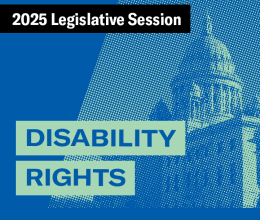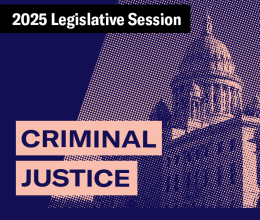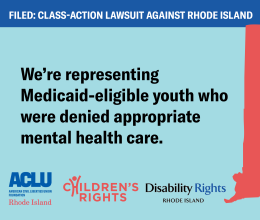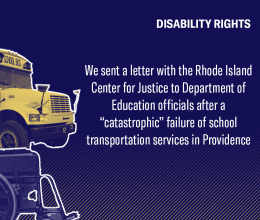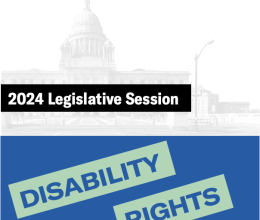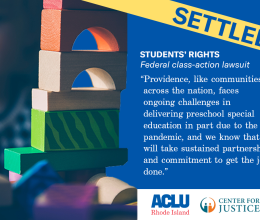Last month, in response to years of glaring failures in Rhode Island’s behavioral health system for children and youth, Disability Rights Rhode Island, the American Civil Liberties Union of Rhode Island, and Children’s Rights filed a class action lawsuit against the State for denying Medicaid-eligible children and youth their right to appropriate mental health care. Today, in a separate but related matter, the State and the U.S. Department of Justice filed a proposed consent decree specifically focusing on the state’s unnecessary segregation of children with behavioral health disabilities in Bradley Hospital. It was submitted contemporaneously with the DOJ’s filing of a lawsuit alleging that the state’s practices were in violation of federal disability law.
Read about the class-action lawsuit
Below is a joint statement from the three organizations about today’s filing:
“Our organizations applaud any effort to address the state’s serious and long-standing failure to protect the rights of children with disabilities from harsh, unnecessary, and counter-productive institutionalization. But the existing problem is far broader than children or youth who are admitted to Bradley Hospital for mental health treatment instead of appropriate community-based settings. There are many, many other RI children and youth placed in other restrictive residential care settings when their mental health conditions could be, and the law requires them to be, adequately treated in less restrictive family-like settings. The current level of dysfunction in segregating youth with mental health needs is exacerbated by the lack of adequate access to intensive in-home services and mobile crisis services that are legally mandated to be available to eligible children and youth under Medicaid. The proposed consent decree offers to address only one small part of this much bigger problem that our lawsuit tackles.
“The proposed consent decree also lacks specific benchmarks for addressing the problem, and saves the adoption of actual implementation plans for a later time. So while this proposal is a step in the right direction, it is critical to emphasize that much more needs to be done. That is why we will vigorously press forward with our lawsuit and seek to ensure that stronger and broader remedies are available for the population covered by this proposed decree and the many other youth not covered by it at all.”


